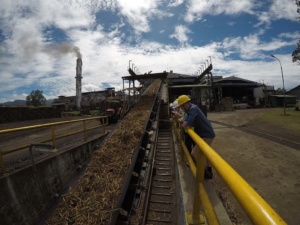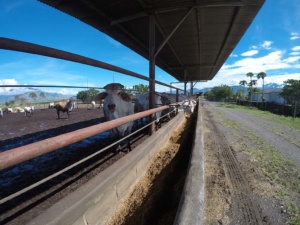Public-private partnerships in rural development
We have all heard about the public-private partnerships (PPP) when it comes to governments building infrastructure like toll roads, but does it have a place in the future of rural development?
How compatible are rural development and private companies?
Often at times, the perception is that large multi-national companies are operating solely to make big profits to line the pockets of the rich investors. But is this truly the case?
I believe that for long-term sustainable rural development to occur, integration with private companies is essential. The pool of Government funded aid and international research funds is ever declining. We need to think of innovative ways of capturing the private dollar to leverage the government funds for larger impacts.

Trukai rainfed rice pilot at Umi. Trukai collaborate with local landholders and assist in growing the rice, rather than buying the land
Private companies can provide access to supply chains and markets and capital that are not available to the smallholder otherwise. As an example consider the smallholder oil palm producers, without the large private companies having milling, refining and marketing divisions their fresh fruit bunches would be worthless.
Private companies now all live by the mantra of Corporate Social Responsibility, the private companies often have the loudest voices when it comes to topics such as climate change and governments acting responsibly. I refer you to the recent address by the head of OLAM at the Global Food Forum in Sydney.
In the past rural development was probably perceived as a government responsibility, our aid money at work in developing countries. There might have even been a perceived conflict between public and private benefits, but this has changed dramatically now. Private companies clearly value social stability, it means that they can operate in a safe environment.
So how do we as researchers for international development tap into this private company network?
We need to be working with these companies from early on in project development. If we can get a milk processor on board early in the life a dairy development project, then they can provide the “pull through” needed for smallholder farmers to change practices.
We need to provide the private companies with a good story to tell, they want their customers to know that they are acting responsibly and we can help them with that.
We can develop true value chains and assist the private company in their dealings with smallholders and demonstrate the value of the research we are conducting.
In my time working in Papua New Guinea with a private company, I was able to see the direct benefits of corporate agriculture for the local villages and smallholder farmers. Smallholder farmers were able to access global markets, expert advice, the latest genetics and a guaranteed payment for their produce. We are currently working with partners in PNG to build a relationship between public and private organisations. This will hopefully yield results for all involved, students, researchers, company employees. We would not be able to ensure the same outcomes if we just focused on either public or private institutions alone.
 |
 |
A recent CSU student tour of Ramu who produce sugar, ethanol and palm oil. Ramu is also the largest beef cattle producer in PNG. Ramu is a subsidiary of New Britain Palm Oil Limited (NBPOL), who work with 17,325 smallholders and outgrowers associated through the supply of product to their mills. Smallholders are “both a core part of [NBPOL’s]corporate responsibility and crucial in the journey towards sustainability.”
After all, when we complete a project having a small-holder – private company partnership that ensures the farmers continue to improve their practices, have market access, are paid a fair price, have access to technology and education is the ultimate goal.


